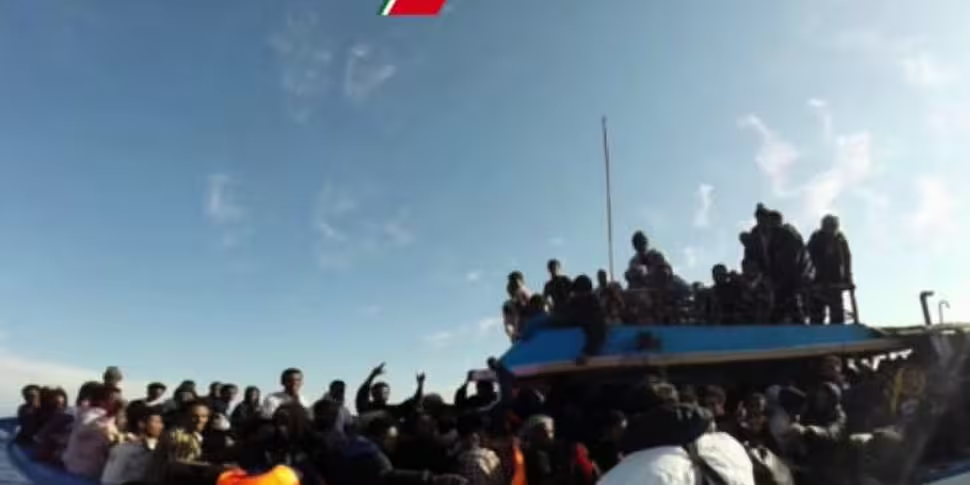Migrants risking their lives to cross the Mediterranean and get to Europe came from more than 40 countries in 2014, according to the United Nations Refugee Agency.
The agency recorded 165,000 people successfully making the perilous journey in 2014, a jump from 60,000 in 2013.
They come mainly from war-torn countries across Africa and the Middle East.
Here's how the numbers break down.
Where they come from
Eritrea 28,557 (25%)
Eritreans have suffered 30 years of conflict. The country emerged from civil war in 1993, only to become embroiled in years of fighting with Yemen and Ethiopia.
Those fleeing repression and indefinite forced military service put their lives at risk from the first leg of the journey.
The government has a shoot-to-kill policy for citizens trying to escape across the border in some areas.
Syria 23,945 (21%)
More than 200,000 people have been killed in Syria's brutal civil war, according to monitoring group the Syrian Observatory for Human Rights and more than 11 million have been displaced.
President Bashar al Assad has faced allegations - backed up by compelling evidence - of using chemical weapons and devastating barrel bombs against his own people.
Meanwhile the conflict created an opportunity for jihadists to flood into the country and set up a base for the Islamic State terrorist group, which has caused chaos in the region.
Mali 7,971 (7%)
A model for African democracy a few years ago, Mali was faced with an insurgency from the Tuareg population in the north.
The country suffered a military coup in 2012 and although democratic rule was returned to the capital Bamako, the unrest allowed al Qaeda's Saharan branch to take over swathes of northern areas.
France launched a military operation at the government's request in 2013 and although the Islamists were pushed back, al Qaeda and Tuareg separatists still pose a threat to stability.
Nigeria 5,861 (5%)
Boko Haram militants have disrupted Nigeria's emergence as an economic powerhouse with a wave of bombings, assassinations and kidnappings - including the abduction of more than 200 schoolgirls from Chibok in 2014.
Many of those fleeing the country are trying to escape their indiscriminate killing, looting and burning of villages in northern and central Nigeria.
The group rejects any political or social activity associated with Western society, including secular education and voting, and has pledged allegiance to Islamic State.
Gambia 5,158 (5%)
President Yahya Jammeh seized power in a bloodless military coup in 1994 and has ruled with an iron fist ever since.
His hopes of ushering in a "new future" by making Gambia a major oil producer have been dashed as the country has yet to strike crude oil - leaving the country heavily reliant to foreign aid.
The president announced Gambia's departure from the Commonwealth, dismissing it as a "neo-colonial" institution - but experts said he was reacting to criticism of a poor human rights record that has caused so many people to flee.
Somalia 3,646 (3%)
The country is in its third decade of instability since the overthrow of president Siad Barre in 1991 created a power vacuum that drew in rival warlords and Islamist fighters.
Al Shabaab extremists have battled government and Ethiopian forces for years, imposing sharia law on much of the south and forming an alliance with al Qaeda.
A series of droughts and famine have also left millions of people on the brink of starvation, often fleeing across the border with Kenya or Ethiopia in surge of food and refuge.
Egypt 3,026 (3%)
Egyptians have been fleeing the instability that has plagued the country since the optimism of the Arab Spring turned to violence and insecurity.
After Mohamed Morsi swept to power in 2012, there was growing concern and ultimately a huge protest movement over his actions against secularists, liberals and Coptic Christians.
After the military ousted Morsi, his Muslim Brotherhood supporters faced a brutal crackdown.
The rise of Egypt's new president Abdul Fattah al Sisi has led to suppression of free speech and political opponents and concerns of an effective return to military dictatorship.
Others 31,602 (31%)
Where they go
The figures below show the number of refugees in European countries, as recorded by the UNHCR, in mid-2014.
Countries not listed had significantly smaller numbers.
Many of these refugees will go on to seek asylum. For example, last year Germany decided on 97,275 asylum cases, allowing 40,560 applications.
- Germany 200,805
- France 237,985
- UK 126,055
- Sweden 114,175
- Italy 76,263
- Netherlands 74,707
- Switzerland 57,783
- Austria 55,598
- Norway 46,106
- Belgium 29,179









